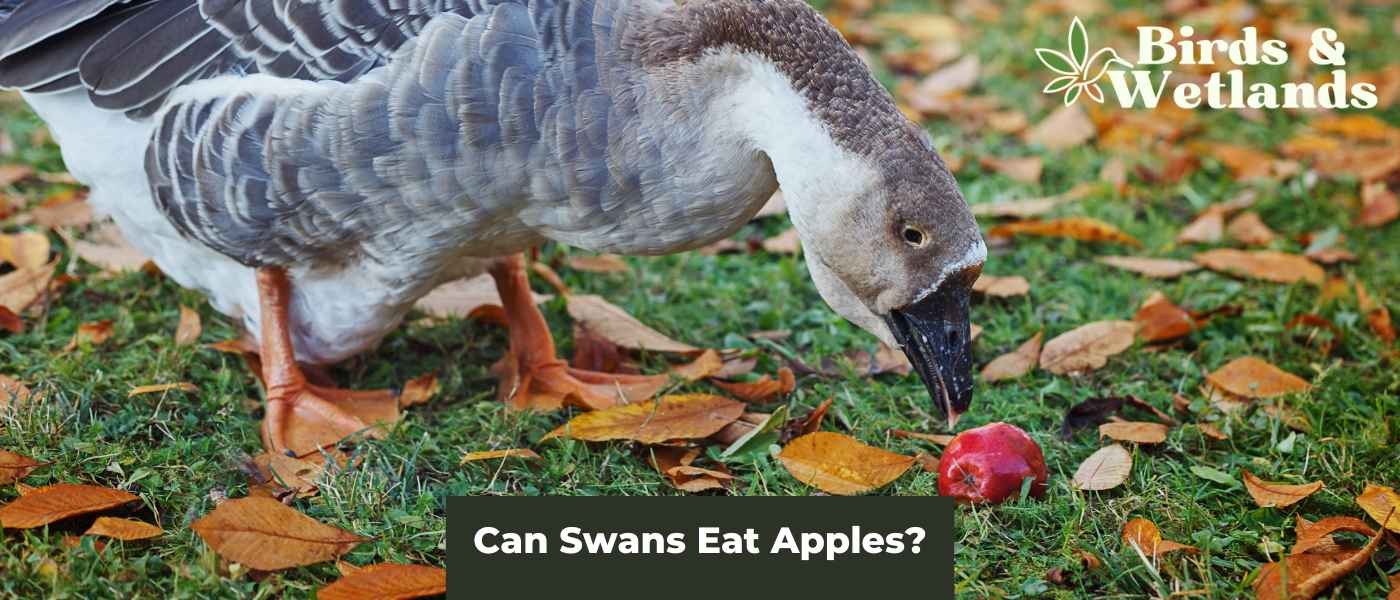Swans are beautiful and elegant birds that are commonly found in ponds and lakes, where people love to feed them. While their primary diet consists of aquatic vegetation, many people also offer them human food as a treat.
Apples, in particular, are a popular snack that people often offer to swans.
But Can Swans Eat Apples?
Yes, swans can eat apples as an occasional treat. Apples are a good source of vitamins, minerals, and dietary fiber, making them a nutritious snack for swans. When offering apples to swans, ensure that they are ripe, clean, and cut into small pieces or thin slices to reduce the risk of choking. Remove any seeds, as they contain small amounts of cyanide, which can be harmful to birds in large quantities.
Key Takeaways on Can Swans Eat Apples
- Swans can eat apples as an occasional treat, which provide vitamins, minerals, and dietary fiber.
- When offering apples, ensure they are ripe, clean, and cut into small pieces or thin slices to reduce the risk of choking.
- Too many apples can cause adult swans to experience digestive problems.
- Remove apple seeds before feeding, as they contain small amounts of cyanide, which can be harmful to birds in large quantities.
- Apples should not be the main source of nutrition for swans; their primary diet should consist of aquatic plants, seeds, and small aquatic animals.
- Feeding swans apples is a good way to provide them with a nutritious snack.
Are apples good for swans?
Swans eat insects and a wide selection of plant matter such as aquatic vegetation, plant foods, wild celery, pond plants, dried corn, leafy greens and wild rice. If plant material is not available, many swans supplement their diet with other foods such as small animals.
If you have a mute swan or whooper swan at your local pond, know that you can actually feed it apples. In fact, apples are better than bread. Many people feed these beautiful birds bread without realizing how this food affects their health.
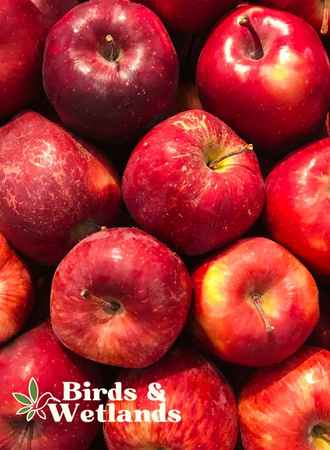
Vitamin C
Apples are rich in vitamin C, an important vitamin for swans. Swans and other waterfowl are constantly being exposed to the elements and diseases in the wild. They need an active defense against pathogens and infections.
Vitamin C helps boost the immune system and protect swans from infections and diseases. Additionally, this vitamin is necessary for the production of collagen and keratin. Keratin is a protein used for developing and maintaining strong and healthy feathers.
Potassium
Potassium is a vital mineral essential for the maintenance of the body’s cells, tissues, and organs. In ducks, potassium plays several important roles in maintaining good health.
Potassium is important for regulating heart function and can help prevent arrhythmias (irregular heartbeats) by controlling the heart’s electrical activity.
Potassium is also involved in regulating blood pressure and can help to lower high blood pressure. Additionally, potassium is necessary for proper muscle function and can help to prevent muscle cramps and weakness. Finally, potassium helps regulate the body’s balance of fluids and can prevent dehydration.
Fiber
Fiber is an important nutrient that can benefit swans in several ways. One key benefit of fiber is its ability to promote regular digestion. Fiber helps to bulk up the stool and can encourage regular bowel movements, which can help to prevent constipation and other digestive problems.
In addition to aiding digestion, fiber can also help swans feel full and satisfied, which can be helpful in weight management.
Fiber can also help to regulate blood sugar levels by slowing down the absorption of sugar in the blood. This can be particularly important for swans prone to diabetes or other blood sugar-related issues.
Can baby swans eat apples?
Baby swans can benefit from eating apples in several ways. Apples are a good source of fiber, which can help regulate baby swans’ digestive systems. In addition, apples are a low-calorie fruit that can help to prevent excess weight gain in young swans.
The nutritional needs of baby swans are similar to those of other young birds. They need to eat a diet high in protein to support the growth and development of their feathers, muscles, and bones.
Apples maybe an acquired taste for swans but they can supplement a diet rich in other protein sources, such as worms, insects, and small fish. These fruits can also provide young swans with other essential nutrients, including vitamins and minerals.
Female swans take their young and the entire swan family into shallow water and help them find food. They use their long necks and serrated beaks to reach the bottom of pond or lake.
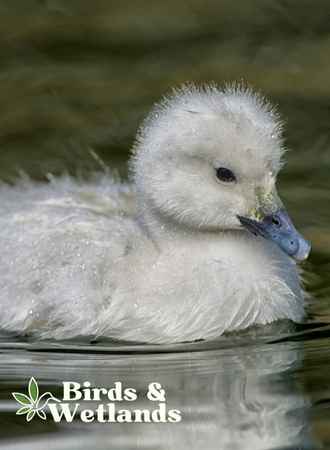
Can swans eat applesauce?
Applesauce is a soft, pureed food made from cooked apples. It is typically made by peeling and chopping apples, cooking them until they are soft, and then blending them into a smooth, thick sauce.
Some people add sweeteners, such as sugar or honey, to applesauce to make it more palatable, but they can also be made without added sweeteners.
Other ingredients added to applesauce may include spices, cinnamon, nutmegs, or other fruit, such as berries or pears.
It is generally safe to give swans applesauce as a treat, unsweetened. Swans, like all birds, are sensitive to changes in their diet, so it is important to introduce new foods, including applesauce, gradually and in small amounts.
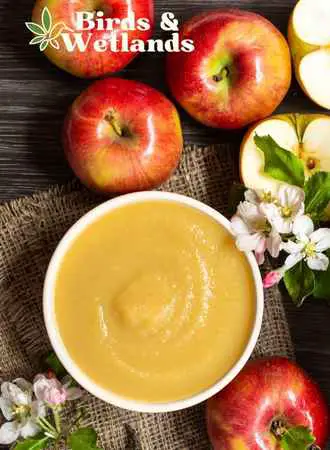
Can swans eat apple seeds?
Swans can eat apples as part of their diet. Apples are a good source of fiber and nutrients and can provide a healthy treat for swans. However, it is important to be mindful of the potential dangers of feeding apples to swans, particularly the seeds.
Apple seeds contain amygdalin, which can harm swans if ingested in large quantities. Amygdalin is a natural compound found in the seeds of many fruits, including apples, apricots, cherries, and plums. It is converted into cyanide when broken down in the body, which can be toxic to birds and other animals.
Amygdalin is dangerous because cyanide can interfere with the body’s ability to use oxygen, leading to breathing difficulties, weakness, and death. In small amounts, amygdalin is not typically harmful to swans, but it is important to avoid feeding large quantities of apple seeds to swans or other birds.
If you feed apples to swans, it is best to remove the seeds first to reduce the risk of ingestion.
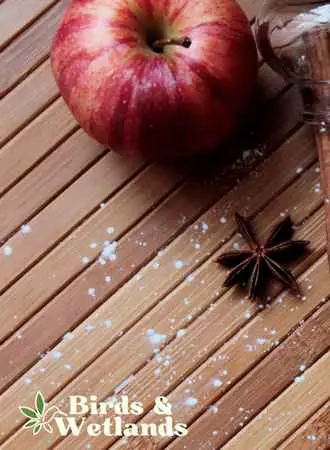
How many apples can swans eat?
Swans can eat apples as an occasional treat, but it is important to give them in moderation. Like all birds, swans have sensitive digestive systems, and they can be prone to digestive problems if they eat too much of any one type of food. In addition, apples are high in sugar, which can contribute to weight gain in swans if they eat too much.
As a general rule, giving swans a few apple slices is safe as an occasional treat. However, apples should not make up a significant portion of a swan’s diet.
In their natural habitat, swans consume saltwater and drink freshwater, whichever is available. Like most animals, they supplement their natural diet with insects and other small animals to maintain a stable total body weight and stay healthy in the winter months.
How to serve apples to swans
- Slice a whole apple into slices and remove the seeds.
- Don’t feed swans bread, salty foods, meaty foods and sugary foods. Instead, give them deseeded apple slices. Feeding bread to swans is bad for their health.
- If you want to mix apples with animal-based foods, give swans small insects and mealworms instead.
- Swans will eat vegetable matter, and among their favorite foods are leafy vegetables, especially lettuce. You can mix apples with these vegetables.
- If you want to offer the a female swan and her young with cereals, bran flakes and cornflakes are the best options. Mix them with apple slices to make a healthy snack
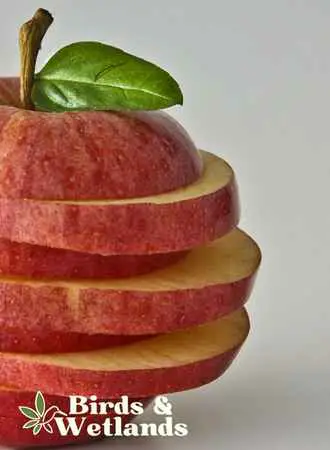
Other Foods for Swans
Best Waterfowl Feed
Delightful Feeding Experience
Transform your backyard into a scenic waterfowl habitat and enjoy an interactive feeding experience with Natural Waterscapes Waterfowl Floating Food.

Pros
- Nutritious Food: Natural Waterscapes Waterfowl Floating Food is specifically designed to provide essential nutrients to waterfowl, including swans, geese, and ducks, helping them maintain a healthy diet.
- Convenient: The food comes in resealable packaging, making it easy to store and use as needed. It is also easy to handle and transport.
- Floating Formula: The floating formula of the food allows it to remain on the surface of the water, making it easier for waterfowl to eat and minimizing the risk of water contamination.
- Attracts Waterfowl: The food is formulated to attract various waterfowl species, including swans, geese, and ducks, to your pond, lake, or other water body, providing an opportunity to observe and enjoy these beautiful creatures.
- Environmentally Friendly: Natural Waterscapes Waterfowl Floating Food is made with environmentally friendly ingredients and does not contain any harmful preservatives, making it safe for both waterfowl and the environment.
Cons
- Shelf Life: The food’s shelf life may be limited compared to other types of waterfowl food due to its natural ingredients and lack of preservatives. This means you may need to use it up quickly after opening the package to prevent it from going bad.

